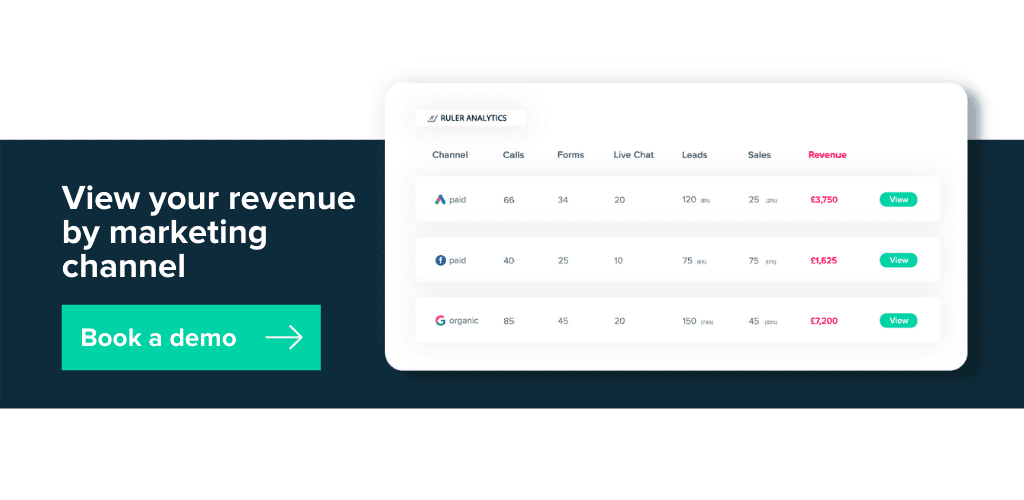HubSpot dominates the sales and marketing sphere. It owns the inbound marketing space but in this blog we explore HubSpot alternatives you need to try in 2023 if you’re looking for something new.
Chances are you’ve read a HubSpot blog or even done one of their free marketing courses.
There’s no denying that HubSpot dominates the inbound marketing space.
But what about HubSpot alternatives? After all, there are plenty of products out there that offer some or all of the same benefits as HubSpot.
In this blog, we’ll look at:
Let’s get stuck in!
Table of Contents
In case you don’t already know, HubSpot is a sales and marketing tool that offers business solutions like automation, CRM and reporting.
It has quickly dominated the space for marketers looking to grow and manage their inbound leads and marketing. With a wealth of solutions no matter what industry or team you work in, HubSpot is a well-rounded tool that can solve all manner of painpoints.
HubSpot is more than just a CRM, it’s an all-encompassing tool for sales and marketing teams to align and drive revenue. Here are a few reasons why HubSpot is so great at what it does:
There’s almost nothing you can’t do in HubSpot. From its CRM with endless segmentation options to its marketing automation software, HubSpot offers huge potential to sales and marketing teams looking to ramp up their outputs. It’s the perfect tool for those looking to align their sales and marketing.
HubSpot offers a pretty generous free plan which gives users the option to add up to 1 million users. Yep, you read that right!
Even better, you can integrate with Gmail and Outlook for realistic email sends, full tracking as well as the ability to send reminders for tasks and objectives.
If you can’t find an answer to a solution in one of their many thousands of helpful blogs, then you can rely on their support team to help you get the most out of the platform. Despite their huge customer base, you can count on quick and knowledgeable support in a multitude of languages.
HubSpot has an endless list of integrations so you can link up your favourite apps and get more out of your subscription.
As with any product or software, HubSpot has its drawbacks. Here are the three main reasons users look for HubSpot alternatives:
The first thing to remember is that HubSpot is billed as separate products. There’s the CRM and sales hub, then the service and marketing hubs. While you can buy these as bundles, it gets expensive quickly.
Not included in these prices are hefty onboarding costs too. HubSpot is difficult software to set up, and so it’s often outsourced to HubSpot professionals for over £1,000 depending on subscriber lists etc.
Most of HubSpot’s best features like attribution are only available in their high-tier packages. Non-enterprise companies are basically locked out of using HubSpot’s best features and are left just able to use the more basic elements like their CRM and automation features.
The trick with HubSpot is getting it to a point where things can tick along nicely without much interference from your team. However, getting to this point takes a lot of time and a lot of work.
And, if HubSpot isn’t being used properly, its cost quickly becomes redundant.
So, you need to ask yourself if you want to fork out for a complex, but worthwhile product, or get started with something a bit more straightforward that will give the same results at a lower cost and lower effort?
⚡️ Pro Tip
Look, we’re experts in attribution. It’s what we do best. And a lot of users look to solve that problem in HubSpot. We’re here to offer you an alternative.
Read more about how attribution in HubSpot works and how you can find a better and more affordable solution.
The short answer is no, not necessarily.
Choosing the right CRM, or any tool for that matters depends entirely on your team and business needs.
While HubSpot is a great CRM choice, it might not be for everyone. And, considering the drawbacks mentioned above, often small to mid-size companies are priced out of making use of major marketing and sales features. So, if this is you, here are some of the best HubSpot alternatives to consider in 2023.
If you’ve landed on this blog, then chances are you’re already using HubSpot and are looking for an alternative, or you’re considering it but want to see what else is out there.
And you would be right to do so!
There are so many tools out there, that it’s important to consider which fits your business and your goals.
Here are some of our favourite alternatives to HubSpot.
The truth is there are plenty of tools out there similar to HubSpot.
Depending on the tools you’re specifically looking for, these are some of the best HubSpot alternatives you should consider:
1. Ruler Analytics: for marketing attribution, lead capture and revenue optimisation
2. ActiveCampaign: for machine learning, marketing automation and email marketing
3. Aritic Pinpoint: for ABM and lead scoring
4. Ontraport: for eCommerce marketing automation and contact management
5. Drip: for contact organisation and revenue optimisation
6. GetRepsonse: for eCommerce companies looking for a tool to manage their webinars
7. Freshworks: for an all-in-one marketing and sales suite
8. Sendinblue: for live chat and email marketing
9. Keap: for appointment management and contact database
10. Engage Bay: for sales and marketing bundles and a robust CRM
11. Wishpond: for marketing automation and drip campaigns
So, let’s dive deeper into what each tool can offer you as an alternative to HubSpot.
Chances are if you’re looking at HubSpot alternatives you use or are planning to use a CRM. Let us be clear, Ruler Analytics is a marketing attribution tool. But it does all the same legwork as HubSpot. Just, instead of having to pay for a whole tool to capture and monitor leads, interactions and revenue, Ruler will send all of the same data to your current apps.
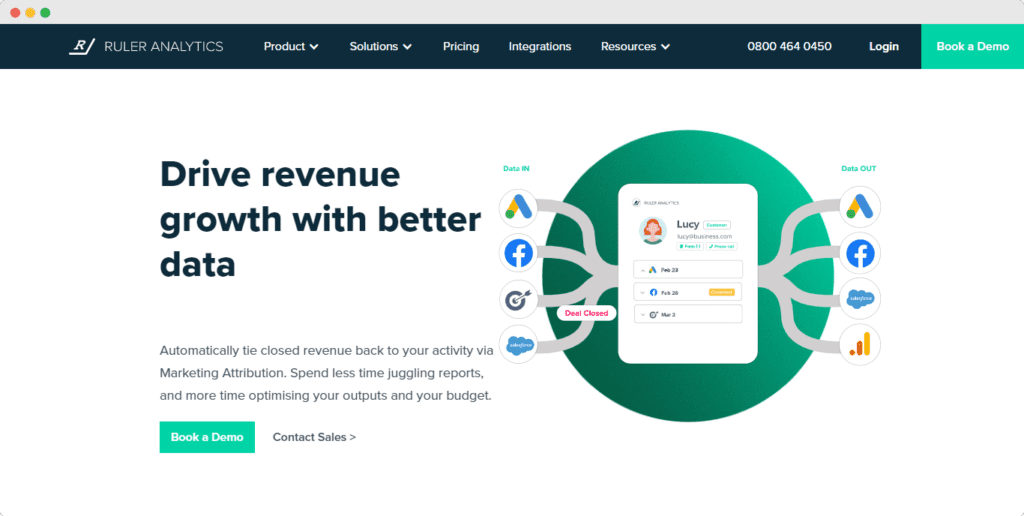
Lead tracking: Just like HubSpot, Ruler Analytics will track your leads. No matter where users come from, Ruler will track their source and continue to track their full customer journey.
So, if you do already have a CRM in place, Ruler will fire all of the lead data there. This means your sales team will be armed with more relevant data when it comes to converting that lead into a sale.
Revenue attribution: Ruler Analytics is the best tool if you want to understand which marketing channels, campaigns and keywords are working best at driving revenue. Forget lead generation, Ruler will scrape revenue data inputted into your CRM and fire it to your analytics tools.
You’ll be able to log into Google Analytics, Google Ads, Facebook etc and see closed revenue accurately attributed to your campaigns, ads and keywords.
Attribution models: Ever wonder how marketing attribution works? There is a range of attribution models to choose from but with Ruler, why choose? You can swap between model types to better understand which channels are working hardest to start, drive and close customer journeys.
🚀 Pro Tip
Want a complete comparison? Read our blog to see how Ruler stacks up to HubSpot to better understand what tools each offers and how Ruler could be a more viable alternative for attribution and lead tracking.
Ruler Analytics vs HubSpot
Ruler Analytics is best for companies battling to track conversions like live chat, form tracking and phone calls. If you see long customer journeys or want to evidence how marketing is impacting closed sales, then Ruler Analytics is the perfect tool to close that gap.
While it doesn’t offer marketing automation or CRM tools, it links with the tools you’re probably already using to do this. It means just one small extra cost, no hard work migrating to a new tool and ongoing support to get more out of your marketing data.
Marketing attribution starts at just £129 per month when billed yearly. Ruler also has discounts available for agency partners.
ActiveCampaign has risen in popularity among marketing teams in the last few years. This marketing automation software offers CRM capabilities and email marketing, meaning it has many of the same features as HubSpot.
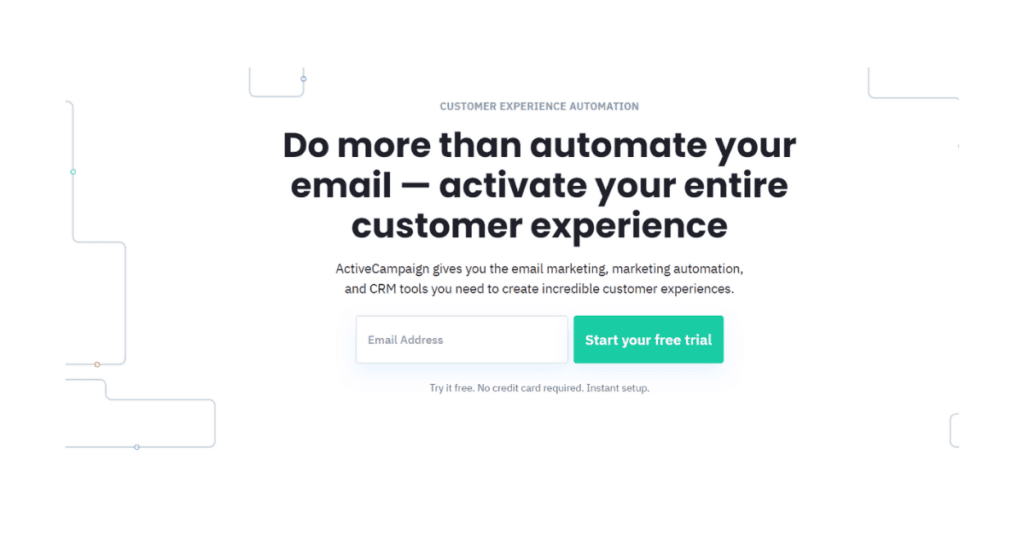
Machine learning: ActiveCampaign’s software is smart, like really smart. It offers predictive sending which learns when your users like to open their emails. By sending emails at the best time for your users, you can boost open rates and conversion rates.
You can also use their win probabilities feature which determines the chance a lead will close.
Automations: One of HubSpot’s clever features is the ability to create email automations from web activity. Well, ActiveCampaign can do this too.
You can set up automated email campaigns for a variety of activities from new tags to lead score to web activity.
CRM capabilities: ActiveCampaign offers plenty of tools to support sales processes so you can make sure a lead is never missed. Lead scoring, win probabilities and advanced segmentation options mean there’s plenty of scope to get detailed with your CRM data.
ActiveCampaign is a great tool with plenty of features. It’s great for varied company sizes looking to get automated marketing on the go. It’s great for lead nurturing and has some great integrations that make it suitable for eCommerce too. But, remember, it’s reporting while robust doesn’t go in-depth on attribution meaning you’ll still struggle to properly track leads.
ActiveCampaign has a varied cost plan starting at just $9 per month. If you have 10,000 contacts and want all the features it’ll cost you $400 per month. It’s still less than HubSpot but still quite an expense to access the full features for a large database.
Like HubSpot, Aritic split its pricing model into various stacks. From marketing to sales and customer service. This productivity software is a great alternative to HubSpot you might want to try.
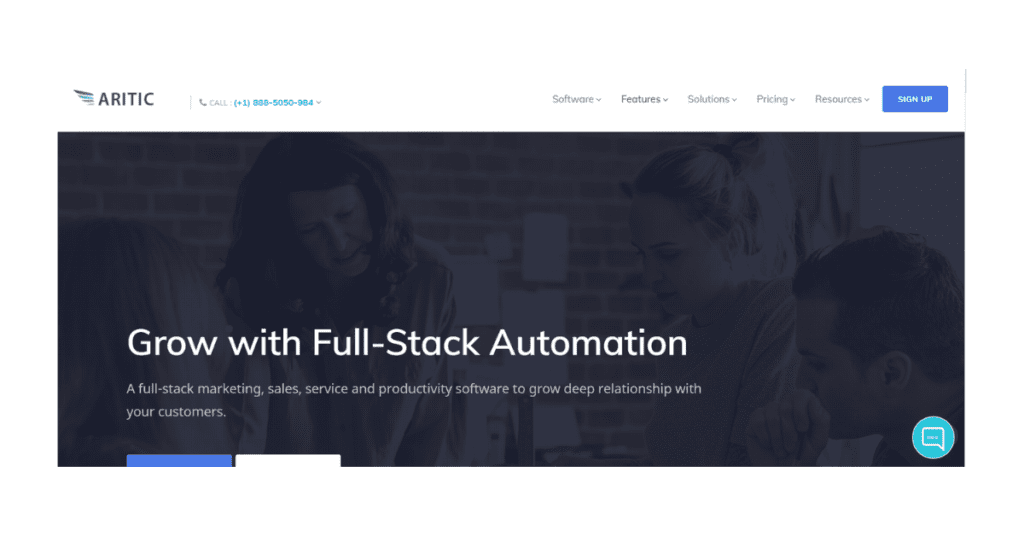
Lead data: Arctic offer a lot of tools that are great for lead management. From lead profiling and lead behaviour tracking, you’ll have access to advanced segmentation options and automations to help convert your leads into sales.
Feature availability: Unlike HubSpot, Aritic doesn’t hide key features behind a paywall. You can access a free CRM with Aritic and you’ll get access to more of the key tools you’ll want for a much better cost.
Aritic will work for most businesses though we do recommend taking some time to work out how to best use the software.
Their cheapest plan starts at just $19 per month and remember, you can use their CRM tool for free. For each product plan, there’s a huge list of features including that your business will find useful.
Ontraport has rapidly grown its customer base in recent years, competing with the likes of ActiveCampaign. You can find a whole host of features like a CRM, landing page creation, email funnelling and marketing plus many more.
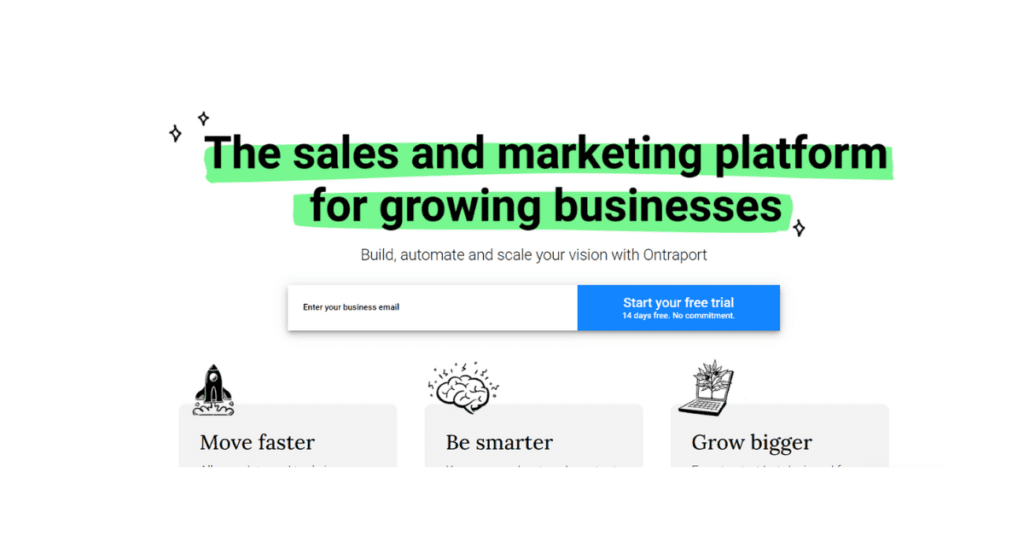
Contact organisation: With Ontraport, you don’t have to worry about endless lists of names and data. Their CRM offers a business-card style organisation. You can also easily group your contact data by job title, demographic etc.
Landing page creation: Ontraport has particularly good landing page creation tools. From lightboxes and A/B testing to one-click upsells, it’s perfect for driving sales online.
Ontraport is primarily best for eCommerce. Its features align more closely with eCommerce marketers as you can provide secure payment processing, share coupons for birthdays, events etc and keep a payment cache for return customers.
In terms of reporting, Ontraport is robust but still doesn’t offer a huge amount of insight into leads and conversion tracking so isn’t best for B2B marketers.
Ontraport’s basic plan starts at $79 per month but there is a two-week trial available to help you decide. While the basic plan is significantly cheaper than HubSpot you are massively restricted in contacts and features available.
If you don’t work in eCommerce, look away now, Drip is not for you. This eCommerce CRM also provides marketing automation capabilities that could make it a good HubSpot alternative for those in the right industry.
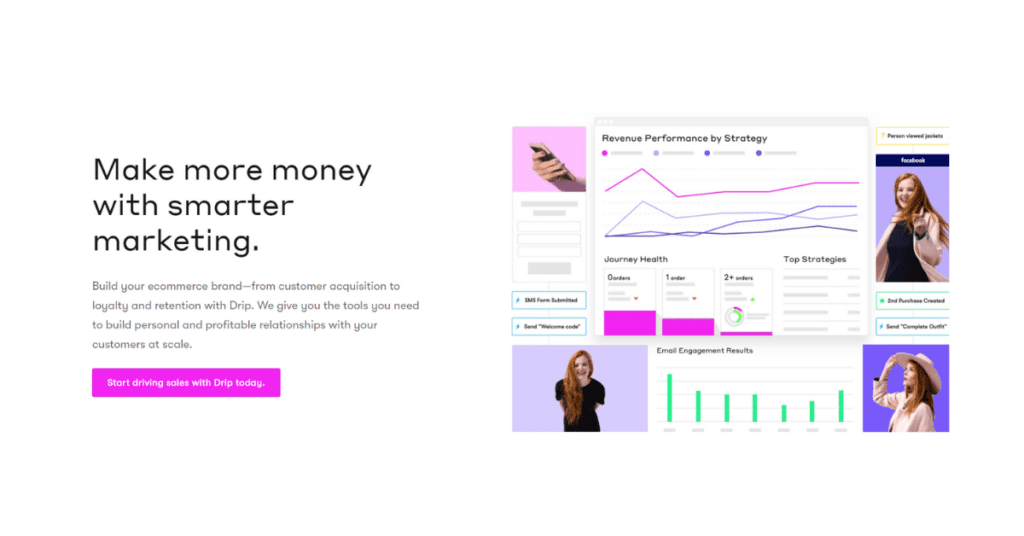
Optimisation for revenue: Drip tracks revenue! Exactly what you need to understand how leads are converting into customers. You can pinpoint revenue for each subscriber and attribute it back to channels and campaigns
Customer data: This platform is great for tracking full customer journeys as you can use tracking events to understand when leads and customers visit your site, when they buy and when they come back for more.
This is a great alternative to HubSpot if you’re an eCommerce business. By integrating it with Google Analytics and your other suite of tools, you should get a good overview of how your marketing is working to drive sales.
Drip has three paid plans. The basic plan starts at $49 per month which offers unlimited email sends and a contact list of 2,500 active users. For those with a contact list of over 5,000, you’ll need to use their Enterprise plan which is a price on application gig.
Predominantly used as an email marketing tool, GetResponse has expanded into marketing automation and landing pages to compete with the likes of ActiveCampaign and more.

Webinars: If you use webinars frequently as part of your marketing strategy, then GetResponse is a fantastic tool.
Not only can you create webinars, but you can encrypt them, personalise the URL, present whiteboards, stream and record your webinar.
You’ll also have access to analytics for your webinars including any conversions, vote responses as well as time spent watching and viewer location.
Workflows: Similar to other marketing automation tools, GetResponse has a great tool for creating automations. With GetResponse you can create visual workflows with filters, actions, conditions as well as score and tag your leads. Their drag-and-drop functionality is easy to use and helps you to make quick changes on the go.
GetResponse is another good option for eCommerce businesses or those who use webinars frequently as a lead generation tool.
GetResponse has four payment options. Basic starts at just $15 a month so is definitely one of the cheapest options on our list. However the basic plan is limited. The Plus plan is GetResponse most popular. It starts at $49 a month and offers a basic CRM, e-product selling, webinars, landing pages and funnel options.
Freshworks is an all-in-one suite that offers customer service and live chat to CRM software and marketing automation. You can opt for a sales or marketing cloud or have an amalgamation of the two.
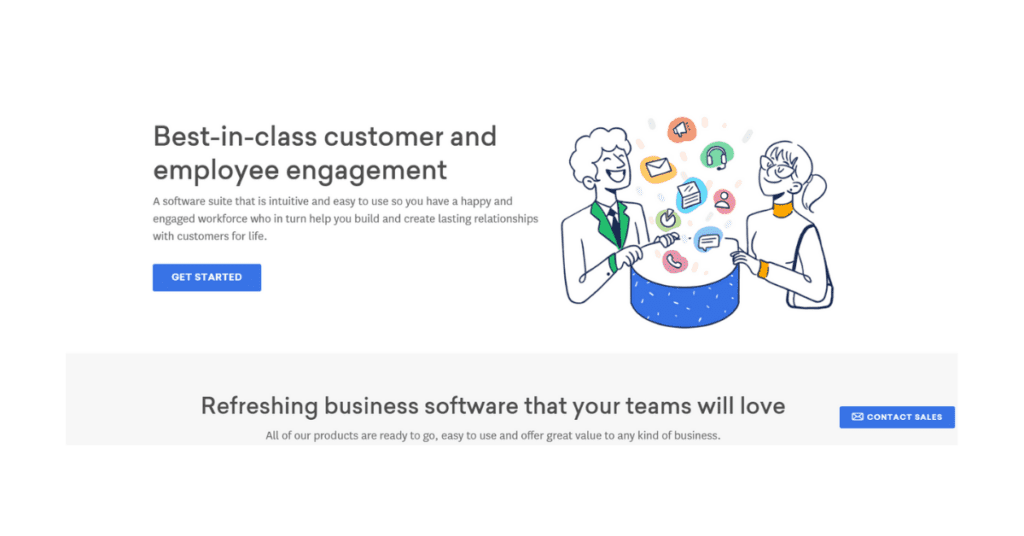
Pricing: We hate to say it but Freshworks pricing structure stands out. It’s much simpler when compared to HubSpot’s and the jump between tiers isn’t quite as severe. There’s also a free plan available for those testing the water.
CRM: The CRM interface is particularly good in Freshworks. It includes a drag-and-drop deal pipeline view which allows you to view key (and sometimes messy) data at a glance. You can add tags like ‘warm lead’ and ‘at risk’ to quickly identify which leads need work which is useful for marketing and sales teams.
Freshworks is very reasonably priced so is great for small businesses. While you might be considering the Sales Cloud plan primarily, it’s worth jumping into the Customer-for-Life cloud as you get more features at no extra cost!
Their basic plan starts at just $29 per month making it a fantastic tool for those looking to get started with a CRM or move to a cheaper solution. This plan gives you just 1,000 contacts so you will need to watch how this cost changes as your list grows.
Sendinblue describes itself as a product made for relationship marketing. With tools like live chat, email and SMS marketing it covers all bases when it comes to marketing channels and so could be used as an alternative to HubSpot.

Live chat: Sendinblue is used by many of its customers as a live chat tool. You can have this manned by a customer service representative or you can offer a bot to answer any prompts.
Email marketing: Sendinblue’s email marketing tools are great. You can add personalised and dynamic content to help boost conversion rates. There is also a library of templates for you to pick from and you can easily edit emails with its drag-and-drop feature.
Sendinblue is a great tool for businesses on a budget looking for an all-in-one solution that won’t break the bank.
Sendinblue has five different pricing plans. There’s a free plan if you’re wanting to test out the product or simply have no budget. It allows you unlimited contacts with an email send of 300 per day.
Email sends jumps up as you move up plans as well as the ability to remove Sendinblue logos. For multiple users, you’ll need to use their Premium plan.
Keap is a CRM that has sales and marketing tools to support growth in a business.
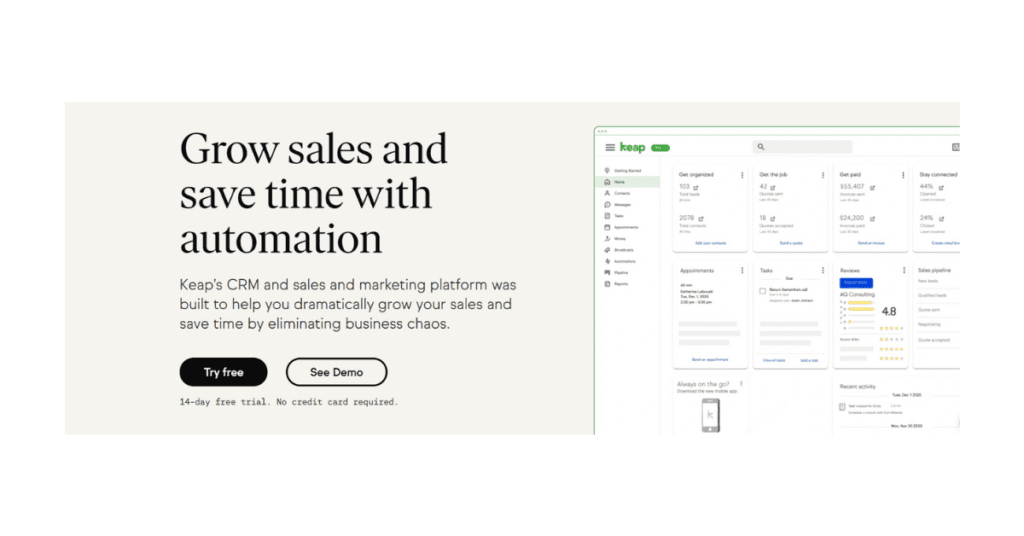
Appointments: One feature Keap offers that makes it a great alternative to HubSpot is its appointment scheduling tool. Here, you can allow your leads and customers to schedule appointments directly into your calendar. This should reduce no-show appointments and back and forth determining a good time to schedule.
CRM: A very similar CRM to HubSpot, you can integrate Google Mail directly into Keap so that any emails you send can be pulled into your CRM too. You can create easy processes for incoming leads and existing contacts to save time writing new emails, with their pre-made options.
Businesses looking for a smart CRM with lead management capabilities.
Pricing is varied depending on your contact list. Keap also offers regular discount so keep an eye out for that. At the time of writing, their cheapest plan was available at $56 per month for the first five months.
EngageBay is built as a valid alternative to HubSpot for startups and small businesses who are priced out of HubSpot but still want a comprehensive and all-inclusive marketing suite.
Similarly to HubSpot, EngageBay is split into hubs of products to support sales, marketing and support.
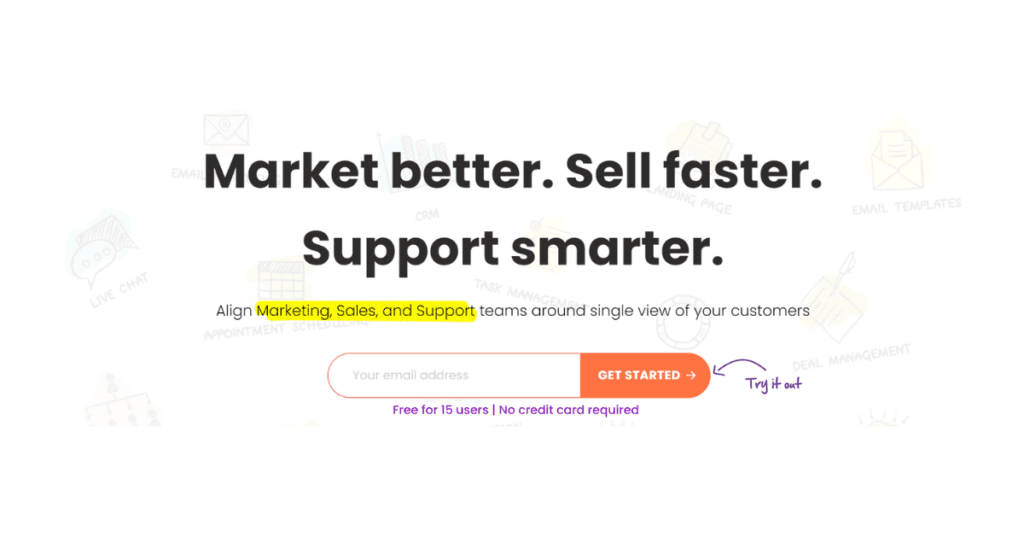
Cost: EngageBay offers their Sales, Marketing and Support bays in one bundle starting at just $8.99 per month, per user. While this doesn’t include all of the features a company would need to get the most out of such a product, it’s the perfect way to dip your toe. And remember, they also have a free version where you can try email marketing, autoresponders and more.
Marketing automation: EngageBay’s marketing automation tool is particularly interesting. You can use email marketing tools for drips, personalisation and sequencing. You can also get on top of social media with brand monitoring, scheduling and engagement stats. Plus, you can create landing pages and web forms so you can keep all of your marketing in one place.
Engage Bay is a great option for small businesses who want more capabilities but at a lower cost. It’s particularly good for marketing automation so if you’re looking for a one-stop shop for your marketing team, this could be the tool for you.
As we mentioned, EngageBay offers a free version with 10,000 contacts. But even their paid plans start just at $8.99 per user, per month. And paid plans are considerably less than HubSpot.
Another HubSpot competitor is Wishpond which offers an all-in-one solution for sales and marketing teams. It was originally designed to support marketers with their output.
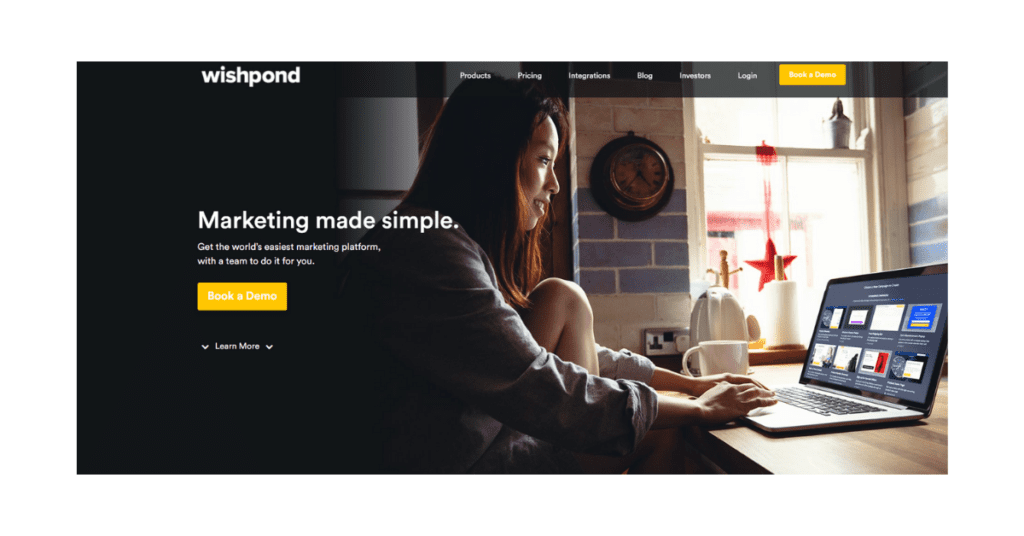
Pop-ups and customisations: Not only can you create your own pop-ups through Wishpond, but you can also customise them for timed delay, scroll, or exit. You can even add animations to your pop-ups. It’s a great additional tool to hook website visitors.
Marketing automation: Wishpond has a whole host of email templates that are modern and easy to use. You can track lead activity, demographics and more for your email campaigns. And, even better, you can send potential leads directly to your sales team’s inbox via a smart automation.
Wishpond is a great solution for a marketing team looking to ramp up their lead generation but needs support with key tools in HubSpot’s pro plans that they can’t afford.
Wishpond have a 14-day free trial that you can make the most of. Their Starting Out plan costs $49 a month and gives you 1,000 leads, no cap on user accounts, marketing automation, drip campaigns, landing pages and more.
There are higher-level plans available if you need more in-depth tools for your team.
Although HubSpot is a fantastic tool, it’s not for everyone. Evaluate the tools that matter most to you and find a specialist.
If lead tracking and attribution is what matters most to you (as it should!), then HubSpot isn’t the solution. Ruler Analytics is the perfect go-between for all of your current tools.
You can book a demo with our team to see how it all works. If you’re looking for a HubSpot alternative that taps into automation and email drips then hopefully one of our other suggestions will have done the trick!
